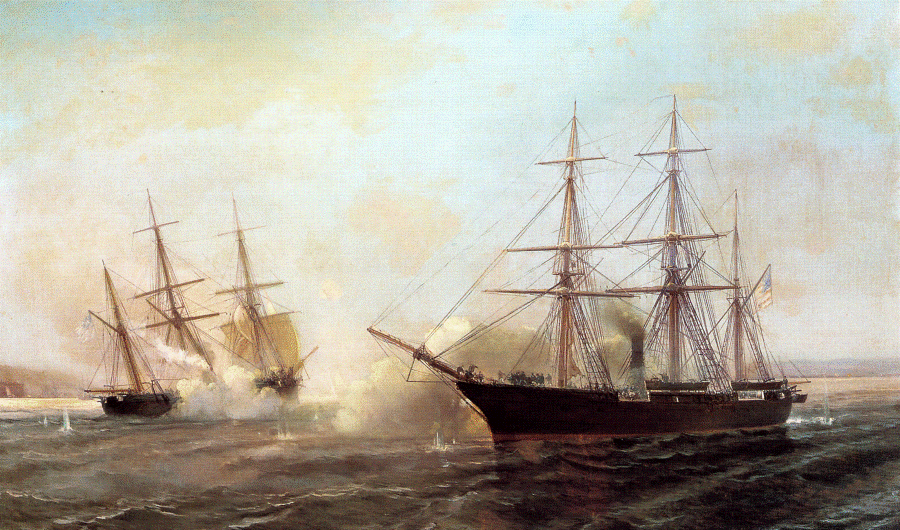
Passionate Abolitionist and
Witness to the American Civil War


Passionate Abolitionist and
Witness to the American Civil War

A post script to an unknown letter probably around 1872 or 1873 (based on reference to “move to reelect Grant as President.” Grant was President from March 4, 1869-March 3, 77, so his reelection campaign would be heating up around late 1872
(Thank you FW for pointing this out) The only TJ letter we have for 1872 appears to have different paper and ink.)
Thomas Jackson explains the politics behind America’s Alabama Claims against England. He defines them as a piece of political theatre to help Grant get reelected. He explains how he predicts Grant will nurse and use the issue for political gain. (See more detailed historical summary below)

The Battle of the U.S.S. “Kearsarge” and the C.S.S. “Alabama”

The C.S.S. Alabama came out of Cherbourg to fight (and be sunk by) U.S.S Kearsarge on June 19, 1864.
Sources
TWO SHORT PAGES AS A POST SCRIPT
page 2


The Alabama Claims represents a fascinating piece of history that very few people know anything about!
In a nutshell, the British broke their commitment to neutrality in America’s War and allowed ships to be built in England for the Confederacy. One of them, The Alabama, caused huge damages against the North and was so effective that it was described as “delaying the end of the war by two years.” On discovering the origins of these ships, the North demanded reparations from the British. They claimed huge sums of money .. . but also the ownership of Canada! They finally settled for $15.5 million dollars.
Alabama Claims are well covered on the web. Eg. http://www.conservapedia.com/
Alabama_Claims_(1862-1872) The Alabama Claims (1862- 1872) were a diplomatic dispute between the United States and Great Britain that arose out of the American Civil War as a result of the depredations on American shipping by British-built raiders in service to the Confederate States of America, and named specifically after CSS Alabama. The peaceful resolution of these claims 7 years after the war ended set an important precedent for solving serious international disputes through arbitration, and laid the foundation for greatly improved relations between Britain and the United States.
The controversy began when Confederate agents contracted for warships from British boatyards. Disguised as merchant vessels during their construction in order to circumvent British neutrality laws, the craft were actually intended as commerce raiders. The most successful of these cruisers was the Alabama, which was launched on July 29, 1862. It captured 58 Northern merchant ships before it was sunk in June 1864 by a U.S. warship off the coast of France. In addition to the Alabama, other British-built ships in the Confederate Navy included the Florida, Georgia, Rappahannock, and Shenandoah. Together, they sank more than 150 Northern ships and impelled much of the U.S. merchant marine to adopt foreign registry. The damage to Northern shipping would have been even worse had not fervent protests from the U.S. Government persuaded British and French officials to seize additional ships intended for the Confederacy. Most famously, on September 3, 1863, the British Government impounded two ironclad, steam-driven “Laird rams” that Confederate agent James D. Bulloch had surreptitiously arranged to be built at a shipyard in Liverpool.
The United States demanded compensation from Britain for the damage wrought by the British-built, Southern-operated commerce raiders, based upon the argument that the British Government, by aiding the creation of a Confederate Navy, had inadequately followed its neutrality laws. The damages discussed were enormous. Charles Sumner, Chairman of the Senate Foreign Relations Committee, argued that British aid to the Confederacy had prolonged the Civil War by 2 years, and indirectly cost the United States hundreds of millions, or even billions of dollars (the figure Sumner suggested was $2.125 billion). Some Americans adopted this argument and suggested that Britain should offer Canada to the United States in compensation. Such proposals were not taken seriously by British statesmen, but they convey the passion with which some Americans viewed the issue.
After years of unsuccessful U.S. diplomatic initiatives, a Joint High Commission meeting in Washington, D.C. during the early part of 1871 arrived at the basis for a settlement. The British Government expressed regret for its contribution to the success of Confederate commerce raiders. This agreement, dated May 8, 1871, and known as the Treaty of Washington, also established an arbitration commission to evaluate the merit of U.S. financial claims on Britain. In addition, the treaty addressed Anglo-American disputes over boundaries and fishing rights. The arbitration commission, which issued its decision in September 1872, rejected American claims for indirect damages, but did order Britain to pay the United States $15.5 million as compensation for the Alabama claims.

The Battle of the U.S.S. “Kearsarge” and the C.S.S. “Alabama”

The C.S.S. Alabama came out of Cherbourg to fight (and be sunk by) U.S.S Kearsarge on June 19, 1864.
Sources